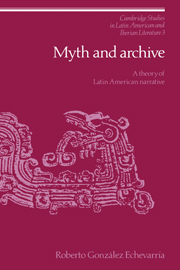Book contents
- Frontmatter
- Contents
- Preface
- Acknowledgments
- 1 A clearing in the jungle: from Santa Mónica to Macondo
- 2 The law of the letter: Garcilaso's Comentarios
- 3 A lost world re-discovered: Sarmiento's Facundo and E. da Cunha's Os Sertões
- 4 The novel as myth and archive: ruins and relics of Tlön
- Notes
- Bibliography
- Index
3 - A lost world re-discovered: Sarmiento's Facundo and E. da Cunha's Os Sertões
Published online by Cambridge University Press: 12 September 2009
- Frontmatter
- Contents
- Preface
- Acknowledgments
- 1 A clearing in the jungle: from Santa Mónica to Macondo
- 2 The law of the letter: Garcilaso's Comentarios
- 3 A lost world re-discovered: Sarmiento's Facundo and E. da Cunha's Os Sertões
- 4 The novel as myth and archive: ruins and relics of Tlön
- Notes
- Bibliography
- Index
Summary
An English traveler at the beginning of the nineteenth century, referring to the journey by canoe and mule that could last as long as fifty days, had written: “This is one of the most miserable and uncomfortable pilgrimages that a human being can make.” This had no longer been true during the first eighty years of steam navigation, and then it became true again forever when the alligators ate the last butterfly and the maternal manatees were gone, the parrots, the monkeys, the villages were gone: everything was gone.
Gabriel García Márquez, El amor en los tiempos del cóleraThe opening sentence of Esteban Echeverría's “El matadero” is ambiguous, but at the same time clearly programmatic: “A pesar de que la mía es historia, no la empezaré por el arca de Noé y la genealogía de sus ascendientes como acostumbraban a hacerlo los antiguos historiadores españoles de América que deben ser nuestros prototipos” (“Although the following narrative is historical, I shall not begin it with Noah's ark and the genealogy of his forbears as was wont once to be done by the ancient Spanish historians of America who should be our model(s”). This is quite a portentous beginning for a mere novella, but Echeverría's is a very ambitious text. The Argentine writer wanted to depict in his story the ruthless repression to which opponents of Rosas' dictatorship were being subjected. The explicit scenes of mayhem are presented in the clinical tone of a scientific observer describing natural phenomena.
- Type
- Chapter
- Information
- Myth and ArchiveA Theory of Latin American Narrative, pp. 93 - 141Publisher: Cambridge University PressPrint publication year: 1990



